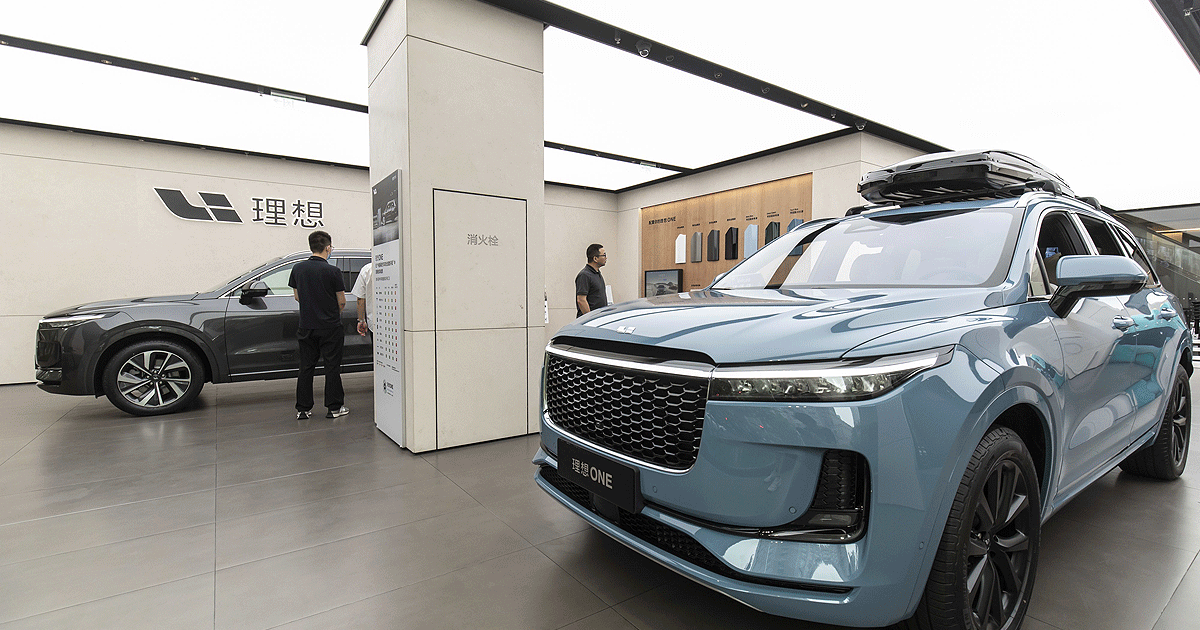
Chinese electric carmaker Li Auto Inc. expects first-quarter revenue to come in as high as $2.7 billion as a revamped and expanded product lineup helps it win sales from rivals including Tesla Inc.
The Beijing auto manufacturer said revenue for the three months ending March 31 should be between 17.5 billion yuan ($2.5 billion) to 18.5 billion yuan, according to a statement Monday, more than the 16.5 billion yuan compiled by Bloomberg consensus estimates.
Li Auto also reported net income of 265.3 million yuan for the three months ended Dec. 31, falling short of analysts’ estimates of 359 million yuan. Revenue jumped 66 percent to 17.7 billion yuan versus the same period of 2021 as Li Auto’s more expensive L9 crossover pushed up shipments and contributed to higher selling prices. The market was looking for 17.6 billion yuan.
“We successfully executed our growth strategy in 2022, cementing our leadership in the family SUV segment while holistically strengthening our business across R&D, supply chain, direct sales and servicing network,” Chairman Li Xiang said.
Fitted with more compact batteries than its key rivals, Li Auto is also more resilient to the increasing cost of lithium. Lithium carbonate prices hit a record high in November. The company’s gross margin for the fourth quarter rose to 20.2 percent from 12.7 percent the quarter prior.
Li Auto, founded in 2015, has been concentrating on so-called “extended-range electric cars,” which use a gasoline engine to provide additional power for the electric motor and boost a vehicle’s driving range.
After the initial launch of the Li One in 2019, the company unveiled three products last year — all roomy crossovers designed for families and priced over 300,000 yuan. The basic version of Tesla’s Model Y SUV starts at 261,900 yuan in China.
Upset by unexpected challenges in 2022, including Covid lockdowns and power cuts on top of an industrywide semiconductor shortage, Li Auto shipped 133,246 vehicles last year. Some 46,319 were delivered in the fourth quarter, in line with the carmaker’s earlier estimate of between 45,000 and 48,000 units.
Li Auto now reckons it can deliver between 52,000 and 55,000 vehicles in the first quarter, representing an increase of 64 percent to about 74 percent from the same period of last year.
For the full year, the company expects to capture around 20 percent of the overall sales of crossovers priced between 300,000 yuan and 500,000 yuan in China this year, Chairman Li said in the earnings call after the statement release. That would be double its market share in 2022 for that price range, he said.
The company sees total sales of the sector at around 1.4 million to 1.5 million units, which means the company now aims to deliver around 300,000 vehicles in 2023. With the ramp-up of recently released products, the automaker is likely to reach a monthly delivery of over 30,000 cars in the second quarter, Li said.
The market for vehicles in the range of 200,000 yuan to 300,000 yuan is more challenging, Li added, since that’s where Tesla’s two locally-built models are priced at. He said Li Auto needs to produce at greater scale before competing in that segment.
Li Auto’s pure EV lineup, which will come later, will also be priced in a range of 200,000 yuan to 500,000 yuan, Li added.
The company’s gross margin guidance will remain at above 20 percent in 2023, Li said.
Sales more broadly of clean vehicles in China are slowing, however.
Shipments of new energy passenger vehicles to dealerships climbed 96 percent to 6.5 million in 2022, the China Passenger Car Association data show, versus growth of 181 percent in 2021. NEV sales are forecast to increase 30 percent to 8.5 million this year after some state EV subsidies fell away.
In an attempt to win back consumers, carmakers have been accelerating new product launches and cutting prices. A staggering 155 pure electric and plug-in hybrid models are expected to be unveiled in China this year, according to Sanford C. Bernstein.
Long-term sales strength is going to require Li Auto to quickly expand its battery-only EV offerings, analysts from Bloomberg Intelligence said in December. But while new models can stoke sales and economies of scale, a more diverse product mix may also dent margins.
Li Auto’s U.S.-traded shares, which sank 37 percent last year, are up 14 percent since January.